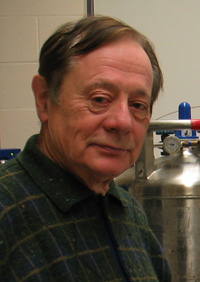 |
Ercole Cavalieri, D.Sc. |
NOTE: This profile is part of a series highlighting the 26 researchers who were named UNMC Distinguished Scientists or New Investigators for 2007. Each of these researchers will be profiled in UNMC Today leading up to a March 20 ceremony to recognize their achievements.
- Name: Ercole Cavalieri, D.Sc.
- Title: Professor in the Eppley Institute and director of the Center for Environmental Health and Toxicology in the College of Public Health
- Joined UNMC: 1971
- Hometown: Milan, Italy
Briefly describe your research in laymen terms, please.
We study the etiology of human cancer and we are demonstrating that breast, prostate and the most prevalent human cancers have a common origin.
What led you to pursue this area of research?
There are two reasons. First, the conquest of cancer is one of the greatest challenges for a researcher. Second, the cancer initiated by chemicals is the result of specific reactions of the chemicals with DNA.
How do you see your research contributing to science?
Understanding the initiation of human cancer can lead to prevention of the disease.
Why did you become a scientist?
I became a scientist because during the years of the Lyceum in Milan, Italy. I was inspired by my science teacher, Professor Grimaldi. She taught organic and inorganic chemistry so well that I did not need to study the matter at home.
What is your hope for the next generation of scientists?
To conquer all the major diseases such as cancer, cardiovascular disease and neurodegenerative disease. Prevention will be the solution of the problem.
Beyond grant funding, how do you measure success?
Grant funding is not a measure of success because the distribution of money is not based on merit. I measure success by resolving key problems that lead to the conquest of a disease.
What would you tell a student interested in a research career?
I would tell a student that he or she should be able to combine his/her talent — namely creativity, inspiration, dedication and hard work — with the capacity to receive grant funding. This is not an easy task with the present system.
Do you have a hero/role model? If so, what do you admire most about them?
My role model in my formative years was Professor Grimaldi. In addition, she contributed tremendously to my decision to become a chemist. Another role model was Albert Szent-Gyorgyi, who received the Nobel Prize for discovering vitamin C. His writings — articles or books — were so inspiring because I had the feeling that the scientific problems in which he was involved were already resolved.
Tell us about your family and hobbies outside of the lab.
My family is presently my two sisters, who live in Italy. I consider my cousins as part of my family because we grew up together. My hobbies are films and concerts with any kind of music. In sports, I like tennis and racquetball. In my youth, soccer was my favorite sport, which I played with some success. Now, I watch it intensely on TV.